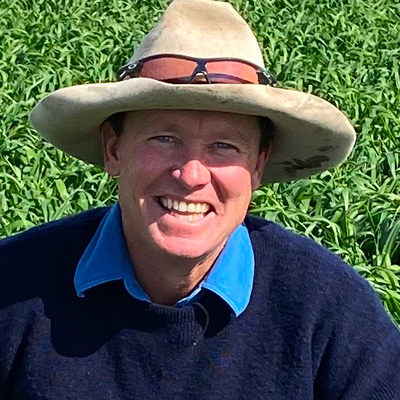
Simon Doolin
National Winner | Sustainability category
North Star, NSW
Simon Doolin is a grower at Doolin Agriculture and a 2020 Growth Awards National Winner in the Sustainability category. Read on to learn more about Simon.
What’s the one thing you have done in your career you are most proud of?
I’m proud that we were able to get through our succession planning as a family. It is probably a farmer’s biggest issue and one that everyone must face twice in their career – once when they enter and once your kids go through it. Completing it successfully, is the most important thing to get right to keep your business alive. It’s taken a long time but we have done it and are now successfully running two operations – my father and brother in one, and myself and my wife in the other.
It was hard for my parents – emotionally and financially. The key to getting it right was for both parties to have their own solicitors, who could talk to each other and keep things fair for both sides. We told them what we both wanted, and they made it happen.
How will you share what you learn with others in the industry?
We learn more from talking to each other than simply attending seminars, and are fortunate to be in an industry that shares its knowledge freely in striving towards the same goals – to be efficient, to be economical and to have growth. I was recently invited on a trip with John Deere to discuss tractor modelling and design and since I got back, I’ve been talking to the dealers and a lot of other farmers in my network across Western Australia, South Australia, Tasmania and NSW about what I saw. Even before the trip I talked to them about their problems with tractors and what they wanted. I find if you talk to influential growers in each region, it is amazing the wealth of knowledge you can tap into and in turn it changes the discussions they have in farm group meetings.
What do you see as your biggest opportunity in the next 12 months?
In the past couple of years, I’ve bought more country and it’s taken me three to four years to get into full production. I think the greatest opportunity is to get our whole farm working at 100 per cent efficiency because this new country is fully developed, improved and ready to go. Within 12 months, I will be in full production. We have had a couple of slower years due to the drought but when you are developing country, you are not getting income off it anyway.
What is the biggest barrier to achieving success in the next 12 months?
Changing weather patterns are probably the biggest barrier to achieving success. But with our farming techniques, we can combat that pretty well with new planters and technology.We have winter and summer crops and some years we get a good winter crop and some years we get a good summer crop but we don’t seem to be able to get both in the same year. We split our risk by having both summer and winter cropping.
Looking back through the weather charts of the past 110-120 years, our weather patterns have always seemed to run in 10-year cycles. It looks like we have had our 10-year dry cycle and are coming out of that into a 10-year wetter cycle so we need to be able to maximise the wetter times.
What is the biggest challenge Australian Ag has to overcome in the next 10 years?
The misrepresentation of the way farmers use their country and chemicals is the big issue we need to face. We are getting blamed for glyphosate problems, we are getting blamed for bad chemical usage and it seems that people with little understanding of what we do are trying to take our vital tools away that we need to farm. We don’t have glyphosate residues in Australia like they do in the US and Canada, but it seems people may be getting their wires crossed. It is really concerning that we could lose vital tools which are used to farm 100 per cent efficiently. It could be the public is being fed the wrong information yet that could result in us being forced to use old techniques which will limit our farming enterprises. There is a gap in understanding of agriculture within urban populations. I sell single origin wheat to bakeries in Sydney, Brisbane and Melbourne and I invite bakers onto my property to see harvest. These bakers may have been in the industry for 40 years and have never seen a wheat harvest or been on a farm before. I give them an accurate picture of what we do and that we use chemicals, but I explain that we manage them with stewardship and that they are necessary for efficient production.